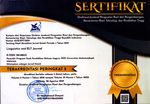The Effect of Audiobook Media on Students’ Listening Comprehension at Tenth Grade of SMA Negeri 2 Tarakan
Abstract
Keywords
Full Text:
PDFReferences
E. Wijayanti, “A Study on Media in Listening Comprehension at Second Year Students of English Language Education Program,” Educ. English as Foreign Lang., vol. 4, pp. 37–48, Jan. 2021, doi: 10.21776/ub.educafl.2021.004.01.04.
D. Puspita and D. Amelia, “Ted-Talk: A Supplement Material to Promote Students’ Autonomy in Listening,” J. English Lang. Teach., vol. 8, pp. 91–102, 2020.
R. Agustin and M. Ayu, “The Impact of Using Instagram for Increasing Vocabulary and Listening Skill,” J. English Lang. Teach. Learn., vol. 2, pp. 1–7, Jun. 2021, doi: 10.33365/jeltl.v2i1.767.
P. A. Lestari, R. Kurniasari, and W. A. Riznanda, “Analysing Teacher’s Difficulties in Teaching Listening Comprehension Putri,” Pharmacogn. Mag., vol. 75, no. 17, pp. 399–405, 2021.
F. M. Ali, “Prosiding Senada (Seminar Nasional Daring) Pemanfaatan Metode Pembelajaran Audiolingual pada Keterampilan Menyimak Peserta Didik,” Senada (Seminar Nas. Daring), pp. 404–407, 2022.
Y. P. Sari, “Pembelajaran Keterampilan Menyimak pada Siswa Kelas VIII SMP Negeri 3 Sungai Kakap,” 2019.
L. Naibaho, “The Integration of Group Discussion Method using Audio Visual Learning Media toward Students’ Learning Achievement on Listening,” Int. J. Res. - GRANTHAALAYAH, vol. 7, pp. 438–445, Aug. 2019, doi: 10.5281/zenodo.3401433.
D. Rizal, S. Masruroh, R. F. R. Syah, I. F. Fathina, M. Amrullah, and S. Zakariyah, “Audiobooks as Media to Increase Listening and Speaking Skills: A Qualitative Systematic Review,” ETERNAL (English, Teaching, Learn. Res. Journal), 2022.
M. A. Assiddiqhi and R. N. Rosa, “Audiobooks Implementation in an EFL Listening Classroom,” J. English Lang. Teach., vol. 10, no. 1, pp. 96–104, 2021, doi: 10.24036/jelt.v10i1.111477.
C. Çarkıt, “Evaluation of Audiobook Listening Experiences of 8th Grade Students,” Educ. Policy Anal. Strateg. Res., vol. 15, no. 4, pp. 146–163, 2020, doi: 10.29329/epasr.2020.323.8.
G. Kartal, “The Effects of Audiobooks on EFL Students’ Listening Comprehension,” Read. MATRIX, vol. 17, pp. 112–123, Apr. 2017.
E. K. Tayşi, “The Effect of Listening Attitude and Listening Anxiety on Listening Comprehension : A Regression Model,” vol. 7, no. 2, pp. 356–364, 2019, doi: 10.13189/ujer.2019.070207.
A. Rahmat, “The Effect of Using Educational Multimedia in Dictation on Students’ Listening Comprehension at MA Darul Hikmah Pekanbaru,” J. ENGLISH Acad., vol. 5, p. 1, Feb. 2018, doi: 10.25299/jshmic.2018.vol5(1).1096.
L. Diora and R. N. Rosa, “An Analysis of Students’ Difficulties in Listening Comprehension: A Descriptive Study at English Language and Literature Department FBS UNP,” J. English Lang. Teach., vol. 9, p. 85, Mar. 2020, doi: 10.24036/jelt.v9i1.107957.
S. Rungsinanont, “Factors nd Problems Affecting English Listening Comprehension Skills of Eic Undergraduate Students at Rmutl Tak, Thailand,” Rev. Gestão Soc. e Ambient., vol. 18, p. e05203, Mar. 2024, doi: 10.24857/rgsa.v18n5-043.
H. Nisa, L. Izzah, and M. Hadi, “The Use of Podcast to Improve Students’ Listening Comprehension,” Eltin J. J. English Lang. Teach. Indones., vol. 10, p. 45, Mar. 2022, doi: 10.22460/eltin.v10i1.p45-54.
R. Fuady and A. A. Mutalib, “Audio-Visual Media in Learning,” J. K6, Educ. Manag., vol. 1, no. 2, pp. 1–6, 2018, doi: 10.11594/jk6em.01.02.01.
C. C. M. Goh, “Metacognition in Second Language Listening,” in The TESOL Encyclopedia of English Language Teaching, 2018, pp. 1–7. doi: https://doi.org/10.1002/9781118784235.eelt0572.
S. Aryana and Y. Apsari, “Analysing Teacher’s Difficulties In Teaching Listening,” Eltin Journal, J. English Lang. Teach. Indones., vol. 6, p. 100, Oct. 2018, doi: 10.22460/eltin.v6i2.p100-106.
T. Abdulrahman, N. Basalama, and M. R. Widodo, “The impact of podcasts on efl students’ listening comprehension,” Int. J. Lang. Educ., vol. 2, no. 2, pp. 23–33, 2018, doi: 10.26858/ijole.v2i2.5878.
E. Aydın and M. Tunagür, “Effect of Audiobook Applications on Listening Skills and Attitudes of 6th Grade Students: A Mixed-Method Study Effect of Audiobook Applications on Listening Skills and Attitudes 2,” Bull. Educ. Res., vol. 43, no. 3, pp. 1–21, 2021.
Khairul Fajry, E. Komariah, and T. M. Silvianti, “Audio Book: Teaching Listening Comprehension,” vol. 1, no. August, pp. 62–70, 2016.
K. Priyadarsini, “Audiobook for Enhancing Listening Skills,” J. English Lang. Teach. Interact. Forum, vol. VIII, p. 40, 2017.
I. Have and B. S. Pedersen, “The audiobook circuit in digital publishing: Voicing the silent revolution,” New Media Soc., vol. 22, no. 3, pp. 409–428, Aug. 2019, doi: 10.1177/1461444819863407.
B. Tusmagambet, “Effects of Audiobooks on EFL Learners’ Reading Development: Focus on Fluency and Motivation,” ENGLISH Teach., vol. 75, pp. 41–67, Jun. 2020, doi: 10.15858/engtea.75.2.202006.41.
E. Marchetti and A. Valente, “Interactivity and multimodality in language learning: the untapped potential of audiobooks,” Univers. Access Inf. Soc., vol. 17, no. 2, pp. 257–274, 2018, doi: 10.1007/s10209-017-0549-5.
M. Burkey, Audiobooks for youth : a practical guide to sound literature. Chicago: American Library Association., 2013.
D. Nunan, “Teaching English to speakers,” Teach. english to Speak. other Lang. -An Introd., pp. 54–56, 2015.
A. Burns and J. Siegel, “Teaching the Four Language Skills: Themes and Issues BT - International Perspectives on Teaching the Four Skills in ELT: Listening, Speaking, Reading, Writing,” A. Burns and J. Siegel, Eds., Cham: Springer International Publishing, 2018, pp. 1–17. doi: 10.1007/978-3-319-63444-9_1.
I. Sofiana and F. Aziez, “A literature review: Improving students listening skills through digital audiobook in EFL classroom,” in International Undergraduate Conference on English Education, 2022.
C. Surkamp, “Teaching English as a Foreign Language”.
D. Richardson et al., Measuring narrative engagement: The heart tells the story. 2018. doi: 10.1101/351148.
A. I. Alrawashdeh and N. N. Al-zayed, “Difficulties That English Teachers Encounter while Teaching Listening Comprehension and Their Attitudes towards Them,” English Lang. Teach., vol. 10, no. 5, p. 167, 2017, doi: 10.5539/elt.v10n5p167.
DOI: https://doi.org/10.31764/leltj.v13i1.29660
Refbacks
- There are currently no refbacks.
Copyright (c) 2025 Ramli Ramli, Woro Kusmaryani, Agustinus Daniel

This work is licensed under a Creative Commons Attribution-ShareAlike 4.0 International License.
_____________________________________________________
Linguistics and ELT Journal
p-ISSN 2339-2940 | e-ISSN 2614-8633

LELTJ is licensed under a Creative Commons Attribution-ShareAlike 4.0 International License.
_____________________________________________________
LELTJ is abstracting & indexing in the following databases:
_____________________________________________________
LELTJ Editorial Office:













